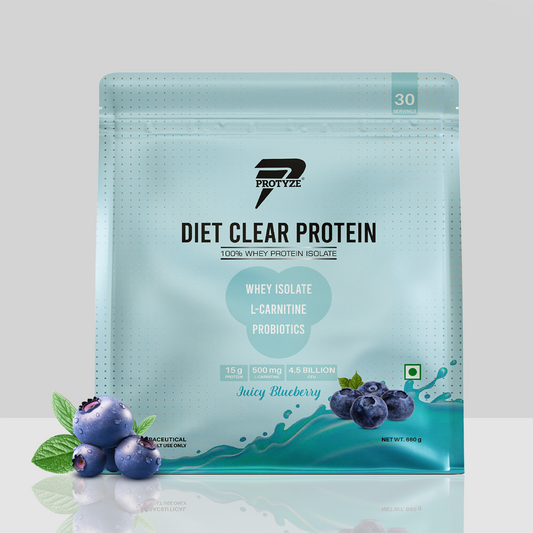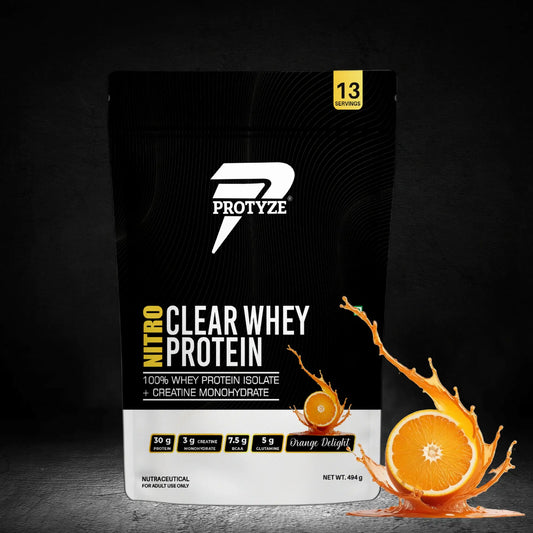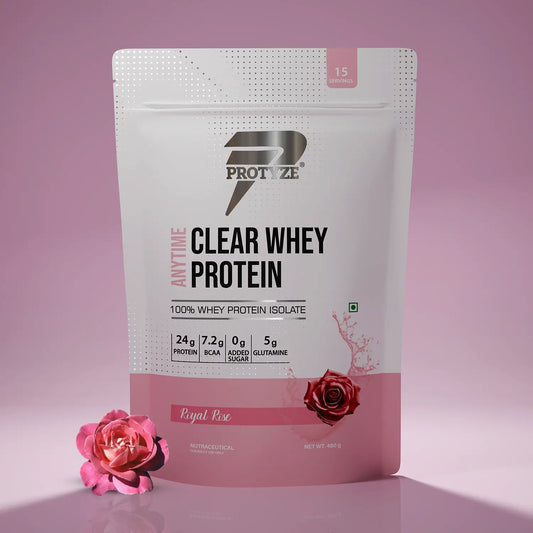When it comes to fitness and building muscle, whey protein is one of the most popular supplements — yet it’s often misunderstood. Many people worry it’s “like steroids” or could be harmful, which keeps them from trying this natural, effective protein source.
In reality, whey protein is completely different from steroids. It’s a natural, fast-digesting protein derived from milk that provides your body with the essential amino acids needed for muscle repair, recovery, and overall health. Unlike steroids, it does not manipulate hormones or cause dangerous side effects — it simply fuels your body to perform at its best.
In this article, we’ll break down why whey protein is safe, how it supports muscle growth, lean mass, and immunity, and why products like Protyze Anytime Clear Whey Protein make getting high-quality protein easy, light, and refreshing for your daily routine.
Understanding Whey Protein
Whey protein is derived from milk during the cheese-making process. It contains all the essential amino acids your body cannot produce on its own, making it a complete protein. Whey protein is fast-digesting, which means it quickly supplies your muscles with the nutrients they need after exercise.
There are different forms of whey protein:
-
Whey Protein Concentrate: Contains some fats and carbs along with protein.
-
Whey Protein Isolate: A purer form of protein with minimal fat and carbs.
- Hydrolyzed Whey Protein: Pre-digested protein that is absorbed very quickly.
Unlike anabolic steroids, which artificially alter hormone levels to force muscle growth, whey protein simply provides the building blocks your body already uses to repair and build muscle naturally.
Why Some People Compare Whey Protein to Steroids
The confusion often comes from the results that whey protein delivers. It helps muscles recover faster and grow stronger, especially when combined with strength training. This visible improvement in muscle tone can make people think whey protein works like steroids.
However, there are key differences:
|
Feature |
Whey Protein |
Steroids |
|---|---|---|
|
Mechanism |
Supplies natural amino acids for muscle repair |
Artificially increases testosterone and anabolic hormones |
|
Safety |
Safe for most healthy adults |
Can cause serious side effects like liver damage, heart problems, hormonal imbalance |
|
Legal Status |
Legal and widely available |
Controlled substances, often illegal without prescription |
|
Health Benefits |
Supports muscle growth, recovery, immunity |
Temporary muscle gain, many long-term risks |
|
Usage |
Can be used daily with proper diet |
Only under strict medical supervision (if at all) |
Clearly, whey protein is a natural, safe, and legal protein source while steroids are synthetic hormones with significant health risks.
Benefits of Whey Protein
Whey protein is not just about building muscles. Its benefits extend to multiple aspects of health and fitness:
1. Muscle Repair and Growth
After a workout, your muscles experience small tears. Whey protein provides the essential amino acids your body needs to repair these tears, helping your muscles grow stronger.
- Whey protein is fast-digesting, making it ideal for post-workout recovery.
- The leucine content in whey protein triggers muscle protein synthesis, the process that builds new muscle tissue.
For instance, Protyze Anytime Clear Whey Protein delivers 24g of clean, fast-absorbing protein per serving. It’s light, refreshing, and easy on the stomach — perfect for daily recovery without the heaviness of traditional shakes.
2. Supports Lean Muscle Development
Not everyone wants to bulk up like a bodybuilder. Whey protein supports lean muscle growth, helping you develop toned and strong muscles rather than just adding mass.
- Helps maintain muscle during weight loss.
- Prevents muscle breakdown during periods of inactivity.
3. Convenient and Effective Nutrition
Meeting your daily protein requirement through food alone can be challenging, especially for busy professionals or active individuals. Whey protein offers a convenient solution:
- No cooking required — mix with water or juice.
- Low in calories and fats (especially isolates).
- Can replace or supplement a meal without adding unnecessary calories.
4. Weight Management and Satiety
High-protein diets can help control appetite. Whey protein is particularly effective because it:
- Increases satiety hormones.
- Reduces cravings between meals.
- Supports fat loss while preserving lean muscle.
In short, whey protein can be a strategic tool for weight management, not just muscle gain.
5. Supports Immunity and Overall Health
Whey protein isn’t just about muscles. It also contains bioactive peptides that support immune function. A strong immune system is especially important for active individuals who put their bodies under physical stress regularly.
Whey Protein vs Steroids: The Key Difference
Let’s address the main concern directly: “Is whey protein harmful like steroids?”
Steroids are synthetic hormones that force your body into unnatural growth, often leading to long-term health issues:
- Liver damage
- High blood pressure
- Hormonal imbalance
- Acne and hair loss
- Mood swings and aggression
Whey protein, on the other hand, is simply a dietary supplement. It does not change your hormone levels or cause the side effects associated with steroids. All it does is provide your body with the raw materials (amino acids) it needs to function optimally.
Who Should Use Whey Protein?
Whey protein is suitable for:
-
Athletes and Gym-goers: To aid recovery and improve performance.
-
Busy Professionals: To conveniently meet protein needs without cooking multiple meals.
-
Weight Management Enthusiasts: To support satiety and fat loss while preserving lean muscle.
- Anyone Focused on Health: Protein is essential for metabolism, immunity, and overall wellness.
How Much Whey Protein Do You Need?
Protein requirements vary depending on activity level, age, and fitness goals:
-
Sedentary adults: 0.8–1g per kg of body weight per day.
-
Active individuals or athletes: 1.2–2g per kg of body weight per day.
- Strength training and muscle gain: Up to 2g per kg of body weight per day.
One serving of whey protein, like Protyze Anytime Clear Whey Protein, provides the equivalent protein of 6–7 eggs, making it easy to hit your daily targets.
Common Myths About Whey Protein
Myth 1: Whey Protein is Steroid-Like
Fact: Whey protein does not alter hormones. It supports natural muscle repair.
Myth 2: Whey Protein Harms Kidneys
Fact: In healthy adults, whey protein is safe. Only people with pre-existing kidney disease need to monitor intake.
Myth 3: Whey Protein Makes You Bulky Overnight
Fact: Muscle growth requires consistent training, calories, and protein. Whey protein alone cannot bulk you up.
Myth 4: Whey Protein Causes Acne
Fact: Most studies show no direct link between whey protein and acne. Hygiene and overall diet play a bigger role.
Practical Tips for Using Whey Protein
-
Post-Workout: Take whey protein within 30–60 minutes after exercise for optimal recovery.
-
Meal Replacement: Can replace a snack or supplement a meal to meet daily protein goals.
-
Mix Wisely: Mix with water, juice, or milk depending on your calorie needs.
- Combine with Whole Foods: Pair with fruits, oats, or vegetables for a balanced nutrient intake.
For a refreshing, easy-to-digest option, Protyze Anytime Clear Whey Protein is ideal. It is light, free from bloating, and delivers a high-quality protein boost any time of the day.
Conclusion
Whey protein is safe, natural, and effective, unlike steroids which artificially manipulate hormones and carry serious health risks. Whey protein works with your body’s natural processes to:
- Repair and build muscle
- Support lean mass
- Boost immunity
- Aid weight management
- Provide convenient nutrition
Including whey protein in your diet can be an excellent way to meet your protein needs efficiently. For anyone looking for a light, high-quality protein option, Protyze Anytime Clear Whey Protein offers a refreshing, easy-to-consume solution that supports your fitness and recovery goals without any heaviness or bloating.





